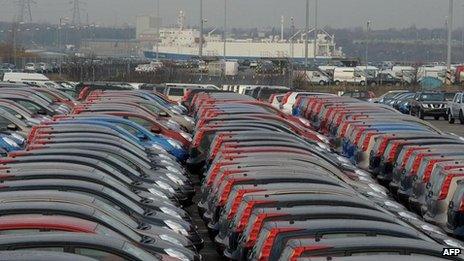When will the UK pay its way?
- Published
- comments

The deficit on trade in goods remains eye-wateringly large
If the priority for the UK is to reduce its indebtedness - public and private sector debts - then today's balance of payments stats are not cheery.
They show the UK was a net borrower from the rest of the world of £65.7bn last year, up from £55.4bn in 2012.
Or to tell you what you already know, austerity is slowing the rate of accumulation of debts in Britain, but the absolute debt burden on Britain continues to increase.
That said, it is not all bad news. There was a cut in the trade deficit from £33.4bn in 2012 to a still high £26.6bn - thanks largely to a rise in the surplus on services by £5.9bn.
But the deficit on trade in goods remains eye-wateringly large, at £107bn - down just a fraction.
The government's longed-for rebalancing to manufacturing is happening, but slowly.
All that said, a different set of figures out today, on business investment, tell a more positive story on the fabled rebalancing: investment in machinery and equipment jumped 24.3% on an annual basis to £10.7bn in the fourth quarter of 2013.
Belatedly, the animal spirits of private sector companies do seem elevated enough to start making proper financial commitments for a more productive future.
Or to state the bloomin' obvious, that investment should in time help our makers to compete more effectively in global markets.
In the round, business investment rose 8.7% in the last three months of 2013, to just £31.9bn.
That can be seen as at last making some kind of contribution to the UK's recovery - although the curmudgeon in me forces me to tell you that businesses are still investing 19% less than at the onset of the recession in the first quarter of 2008.
Oh, and in case you wondered why the chancellor in the Budget extended the life of the first Help to Buy scheme - which provides taxpayer support for purchases of new houses - investment in dwellings rose 9.9% in the fourth quarter of last year compared with 12 months earlier.
But back to the UK's dire trading and investment relationship with the planet.
The deficit on the current account - trade plus income flows - in the fourth quarter of the year fell a teeny weeny bit to £22.4bn, from £22.8bn.
As a share of GDP or output, those deficits equate to 5.4% and 5.6% - which are right at the top end of deficits suffered by the UK over the past 30 years.
What is both striking and politically charged, the deficit with the European Union was a record £23.8bn, whereas we actually earned a surplus (albeit small) of £1.48bn with the rest of the globe.
And just to remind you of the underlying story, 1983 was the last the last time the UK was a net lender to the rest of the world - it was the last time we paid our way, as it were.
But underneath this manifestation of a serious structural flaw in our economy are shifts that aren't all bad.
So the trade deficit in the fourth quarter narrowed from £10bn to £5.7bn.
What leapt was the volatile deficit on investment income - or how much the UK earns on investments abroad subtracted from income paid to investors in the UK - which jumped from £5.8bn to an all-time record £10.2bn.
There has been quite a pronounced widening over many months in how much foreigners earn from their holdings of British shares and bonds compared with how much British investors earn from their comparable overseas holdings.
And another thing.
In the fourth quarter of the year, there appear to have been losses generated by most global banks, but proportionately bigger losses for UK banks on their overseas activities.
Or to put it another way, an important contributor to a fall in the surplus on direct investments appears to be retrenchment by UK banks, especially the semi nationalised ones, Lloyds and RBS.
Which highlights the tension between the government's desire to make these banks safe, by cutting them down to size, and the imperative of encouraging UK companies to be more ambitious overseas.